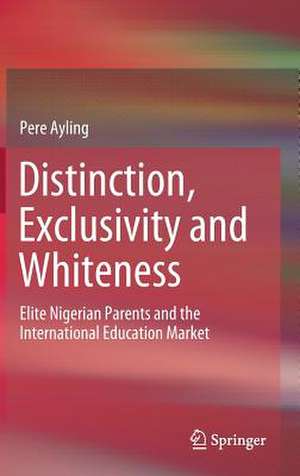Distinction, Exclusivity and Whiteness: Elite Nigerian Parents and the International Education Market
Autor Pere Aylingen Limba Engleză Hardback – 28 feb 2019
Throughout, the book tackles two important, albeit uncomfortable questions: Why does whiteness hold the highest possible value in postcolonial societies such as Nigeria? And, more importantly, why do black people accept the hegemonic discourse that West/white is best?
Combining the theoretical frameworks of Pierre Bourdieu and Frantz Fanon, the book reveals ‘Whiteness’ as a highly valuable form of cultural and symbolic capital that plays a crucial role in the formation of, and struggle for, elite status and distinction in modern-day Nigeria. Drawing on rare qualitative data sets along with postcolonial literatures, the book reveals how British whiteness is used by those working at and for British private schools in Nigeria (BPS-NIG) as an informal but powerful mechanism of ‘quality’ control, and in constructing the image of ‘world-class’ educational establishments.
Preț: 387.75 lei
Nou
Puncte Express: 582
Preț estimativ în valută:
74.19€ • 77.67$ • 61.39£
74.19€ • 77.67$ • 61.39£
Carte tipărită la comandă
Livrare economică 07-21 aprilie
Preluare comenzi: 021 569.72.76
Specificații
ISBN-13: 9789811357800
ISBN-10: 9811357803
Pagini: 220
Ilustrații: XIX, 143 p. 1 illus.
Dimensiuni: 155 x 235 mm
Greutate: 0.41 kg
Ediția:1st ed. 2019
Editura: Springer Nature Singapore
Colecția Springer
Locul publicării:Singapore, Singapore
ISBN-10: 9811357803
Pagini: 220
Ilustrații: XIX, 143 p. 1 illus.
Dimensiuni: 155 x 235 mm
Greutate: 0.41 kg
Ediția:1st ed. 2019
Editura: Springer Nature Singapore
Colecția Springer
Locul publicării:Singapore, Singapore
Cuprins
1 An introduction: Researching the contemporary Nigerian elites.- Part 1.- 2 Bordieu's Theory of practice.- 3 Frantz Fanon: Whiteness, Colonialism and the 'Colonial habitus'.- 4 Elite schools as sites for elite class reproduction and identity formation.- Part 2.- 5 Whiteness: The colour of 'quality' education in contemporary Nigeria.- 6 The Soft-selling of 'World-class' Education.- 7 The making of the contemporary Nigerian 'elite' Child.- 8 Consuming overseas schooling: An act of parental love?.- 9 Researching elite Nigerian parents: Lessons learned and new directions.
Notă biografică
Dr. Pere Ayling is a lecturer and researcher at the University of Suffolk. A trained sociologist, her areas of specialization include consumption, (in)equality, race, elite education and class (re)production strategies. She is particularly interested in how social class, gender and race intersect to (re)produce ‘privilege’ and ‘inequality’ in education and society in general.
Having been educated in Nigeria and the UK has provided her with a broader and unique perspective on key issues in education beyond England in particular and Europe in general. As a sociologist, her areas of interest are in the sociology of education, race and disability. However, her work also explores how habitus, field and capital interact to (re)produce privilege and inequality in education and society in general. She is equally interested in understanding how and why concepts such as white and whiteness are used to construct the ideas of quality and world-class status by private schools in thetransnational education market.
Having been educated in Nigeria and the UK has provided her with a broader and unique perspective on key issues in education beyond England in particular and Europe in general. As a sociologist, her areas of interest are in the sociology of education, race and disability. However, her work also explores how habitus, field and capital interact to (re)produce privilege and inequality in education and society in general. She is equally interested in understanding how and why concepts such as white and whiteness are used to construct the ideas of quality and world-class status by private schools in thetransnational education market.
Textul de pe ultima copertă
This book offers unique insights into elite Nigerian parents’ engagement with, and use of, the international secondary education market as they attempt to retain their social standing - via their children - under today’s shifting global conditions.
Throughout, the book tackles two important, albeit uncomfortable questions: Why does whiteness hold the highest possible value in postcolonial societies such as Nigeria? And, more importantly, why do black people accept the hegemonic discourse that West/white is best?
Caracteristici
Brings two of the most important scholars of the twentieth century – Frantz Fanon and Pierre Bourdieu – into dialogue in an innovative and dynamic way Makes a significant contribution to our understanding of the formation and preservation of elite status in postcolonial Nigeria Reveals how Nigerian elite parent’ school choice decisions in the international education market is a function of their ‘colonial habitus’ Reveals how British private schools in Nigeria strategically position white teachers and deploy the ‘white rota’ in their attempts to construct and maintain a ‘world-class’ brand image Critically examines three inter-related micro-social processes employed by elite Nigerian parents in an attempt to transform their children into transnational elites
